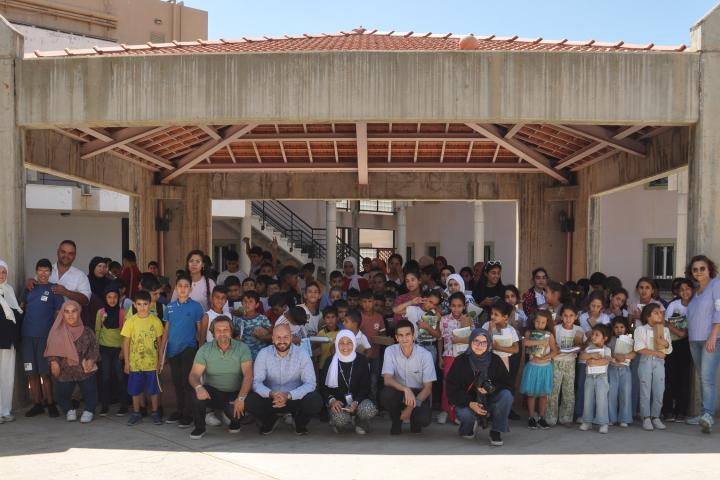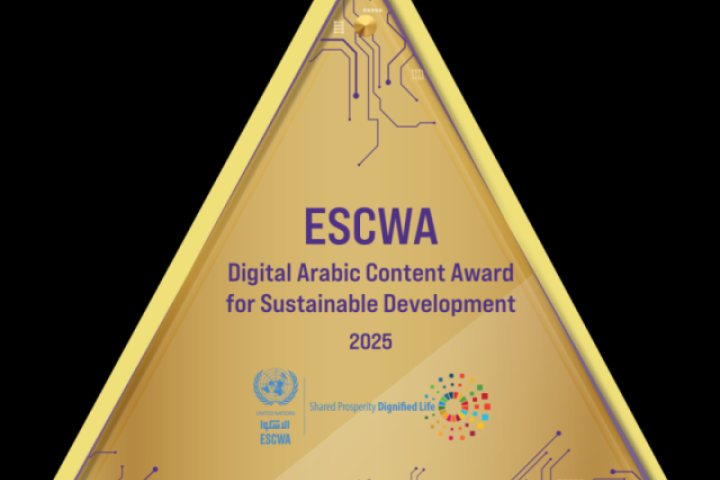Held under the title “The Implementation of the 2030 Agenda for Sustainable Development in the Arab States,” the ESCWA 29th Session opened today in Doha, Qatar, at the level of senior delegates, and will open at the ministerial level tomorrow 14 December.
The ESCWA Session is held at the Sheraton Grand hotel in Doha until 15 December 2016, when participants will issue a declaration focusing on the implementation of the 2030 Agenda for Sustainable Development in the Arab States.
The ESCWA Session, which takes places bi-annually, represents its highest decision-making forum and mechanism. Ministers and high-level officials representing the member countries of ESCWA; representatives of United Nations agencies and programs; delegates of UN member countries non-members in ESCWA; the Diplomatic Corps accredited to Qatar and a score of officials; delegates of regional and international non-governmental organizations; delegates of donor institutions and foundations; as well as a crowd of regional and international experts will also participate in the event.
The inaugural meeting of the session opened with a welcome statement by ESCWA Secretary of the Commission Karim Khalil, followed by statements of representative Bahrain, which had chaired ESCWA 28th Session, Ambassador Tawfeeq Al-Mansoor, and ESCWA Deputy Executive Secretary Abdallah Al-Dardari, who spoke on behalf of the Commission.
As per ESCWA internal regulation 226 (D-21) dated 11 May 2001, which stipulates that the member countries shall assume the chairmanship of the Session on a rotating basis, in the Arabic alphabetical order employed by the United Nations, and as per the provisions of Article 12, the Commission shall elect two vice-chairs and a rapporteur from among the representatives of its member states at the beginning of each Session.
The Kingdom of Bahrain had assumed the chairmanship of the 28th Session held in Tunis in September 2014. After coordination with the Republic of Tunisia, which follows Bahrain alphabetically, with Qatar, which hosts the current session meetings, and with the current chairmanship of the Session, it was decided that Qatar should assume chairmanship of ESCWA 29th Session, to be followed again by Tunis at the 30th Session, as per Arabic alphabetical order. The Republic of Tunisia was selected as Vice Chair, while the Kingdom of Bahrain was selected as Second Vice Chair. The Republic of Sudan was chosen as Rapporteur.
Al Hammadi
Following the elections, Qatari representative Secretary General of the Foreign Ministry Ahmed bin Hassan Al Hammadi, chaired the Session at the level of senior delegates and thanked Bahrain for the great efforts exerted during the latest period during its chairmanship to the 28th Session that was rich in activities.
“The meetings of senior delegates during this session have a demanding agenda, with clauses related to the Commission’s work programme, such as following up on the implementation of resolutions taken at the previous session, the financial status of the Commission, as well as major items related to issues that concern us all, like ESCWA Secretariat’s coming activities to support the Palestinian people,” he said.
He added: “We rely on your support to make our discussions efficient, so that the ministers be able to examine the key topic of the Session and come out with a strong ministerial declaration that reflects the region disposition towards implementing the 2030 Agenda for Sustainable Development.”
Morning meetings
Participants in the morning meetings discussed ESCWA Executive Secretary’s report on the activities of the Commission, which includes the implementation of the Tunis Declaration and the resolutions adopted by the Commission at its 28th Session; the reports of the Executive Committee on its meetings; the programme performance for 2014-2015; the reports of the Commission sub-divisions on their sessions; the Technical Cooperation and Regional Advisory Services Programme; the financial status of the Commission; the evaluation of the work of the Commission; proposed amendments to the programme of work for the biennium 2016-2017; and the revised draft strategic framework for the biennium 2018-2019.
ESCWA in Brief
ESCWA is one of the five UN regional commissions. It provides a framework for the formulation and harmonization of sectoral policies for member countries; a platform for congress and coordination; a home for expertise and knowledge, and an information observatory. It aims at supporting economic and social cooperation between the region’s countries and promoting development process in order to achieve regional integration.
Mauritania became member of ESCWA in September 2015. By this new membership, the number of ESCWA countries rose to 18, including: Bahrain, Egypt, Iraq, Jordan, Kuwait, Lebanon, Libya, Morocco, Oman, Palestine, Qatar, Saudi Arabia, the Sudan, the Syrian Arab Republic, Tunisia, the United Arab Emirates and Yemen.
The ESCWA Session is held at the Sheraton Grand hotel in Doha until 15 December 2016, when participants will issue a declaration focusing on the implementation of the 2030 Agenda for Sustainable Development in the Arab States.
The ESCWA Session, which takes places bi-annually, represents its highest decision-making forum and mechanism. Ministers and high-level officials representing the member countries of ESCWA; representatives of United Nations agencies and programs; delegates of UN member countries non-members in ESCWA; the Diplomatic Corps accredited to Qatar and a score of officials; delegates of regional and international non-governmental organizations; delegates of donor institutions and foundations; as well as a crowd of regional and international experts will also participate in the event.
The inaugural meeting of the session opened with a welcome statement by ESCWA Secretary of the Commission Karim Khalil, followed by statements of representative Bahrain, which had chaired ESCWA 28th Session, Ambassador Tawfeeq Al-Mansoor, and ESCWA Deputy Executive Secretary Abdallah Al-Dardari, who spoke on behalf of the Commission.
As per ESCWA internal regulation 226 (D-21) dated 11 May 2001, which stipulates that the member countries shall assume the chairmanship of the Session on a rotating basis, in the Arabic alphabetical order employed by the United Nations, and as per the provisions of Article 12, the Commission shall elect two vice-chairs and a rapporteur from among the representatives of its member states at the beginning of each Session.
The Kingdom of Bahrain had assumed the chairmanship of the 28th Session held in Tunis in September 2014. After coordination with the Republic of Tunisia, which follows Bahrain alphabetically, with Qatar, which hosts the current session meetings, and with the current chairmanship of the Session, it was decided that Qatar should assume chairmanship of ESCWA 29th Session, to be followed again by Tunis at the 30th Session, as per Arabic alphabetical order. The Republic of Tunisia was selected as Vice Chair, while the Kingdom of Bahrain was selected as Second Vice Chair. The Republic of Sudan was chosen as Rapporteur.
Al Hammadi
Following the elections, Qatari representative Secretary General of the Foreign Ministry Ahmed bin Hassan Al Hammadi, chaired the Session at the level of senior delegates and thanked Bahrain for the great efforts exerted during the latest period during its chairmanship to the 28th Session that was rich in activities.
“The meetings of senior delegates during this session have a demanding agenda, with clauses related to the Commission’s work programme, such as following up on the implementation of resolutions taken at the previous session, the financial status of the Commission, as well as major items related to issues that concern us all, like ESCWA Secretariat’s coming activities to support the Palestinian people,” he said.
He added: “We rely on your support to make our discussions efficient, so that the ministers be able to examine the key topic of the Session and come out with a strong ministerial declaration that reflects the region disposition towards implementing the 2030 Agenda for Sustainable Development.”
Morning meetings
Participants in the morning meetings discussed ESCWA Executive Secretary’s report on the activities of the Commission, which includes the implementation of the Tunis Declaration and the resolutions adopted by the Commission at its 28th Session; the reports of the Executive Committee on its meetings; the programme performance for 2014-2015; the reports of the Commission sub-divisions on their sessions; the Technical Cooperation and Regional Advisory Services Programme; the financial status of the Commission; the evaluation of the work of the Commission; proposed amendments to the programme of work for the biennium 2016-2017; and the revised draft strategic framework for the biennium 2018-2019.
ESCWA in Brief
ESCWA is one of the five UN regional commissions. It provides a framework for the formulation and harmonization of sectoral policies for member countries; a platform for congress and coordination; a home for expertise and knowledge, and an information observatory. It aims at supporting economic and social cooperation between the region’s countries and promoting development process in order to achieve regional integration.
Mauritania became member of ESCWA in September 2015. By this new membership, the number of ESCWA countries rose to 18, including: Bahrain, Egypt, Iraq, Jordan, Kuwait, Lebanon, Libya, Morocco, Oman, Palestine, Qatar, Saudi Arabia, the Sudan, the Syrian Arab Republic, Tunisia, the United Arab Emirates and Yemen.
*****
For more information:
Nabil Abu-Dargham +961-70-99 31 44
Ms. Mirane Abi-Zaki +961-76-04 64 02
dargham@un.org
abi-zaki@un.org
escwa-ciu@un.org
For more ESCWA news, please visit:
Website: www.unescwa.org Facebook: www.facebook.com/unescwa Twitter: @ESCWACIU



